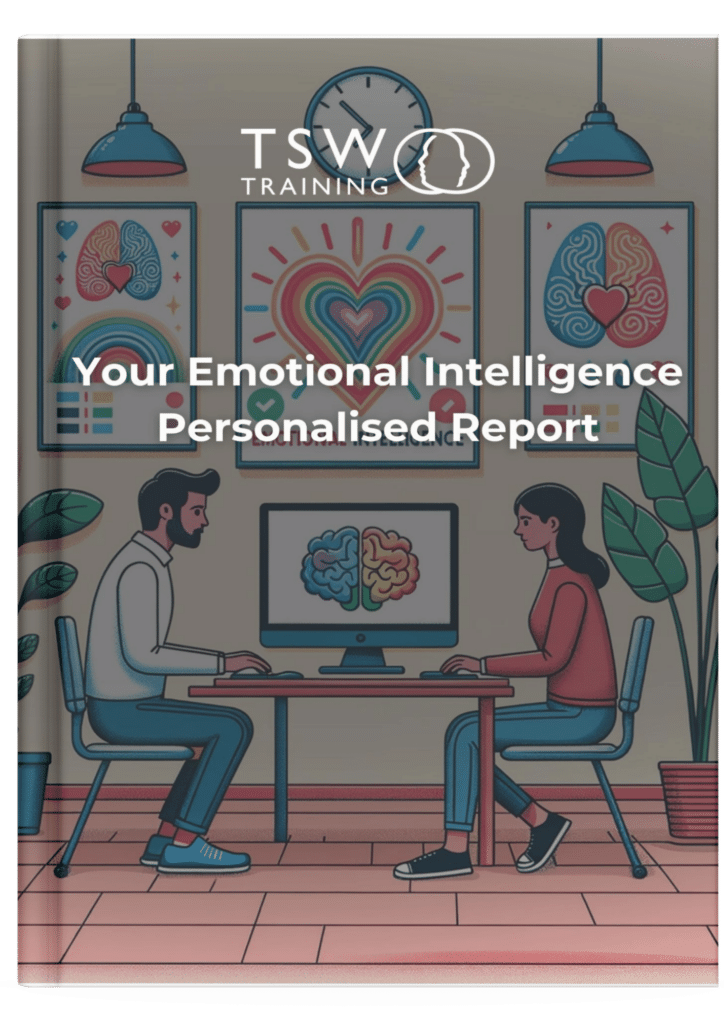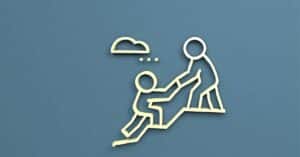The term ‘emotional intelligence’ was first used in 1990 by Peter Salovey and John D Mayer and it grew in popularity after Daniel Goleman published his 1995 book Emotional Intelligence – Why it can matter more than IQ.
Developing a team with a high level of emotional intelligence (EI) is beneficial as it encourages a healthy culture, builds strong relationships, improves communication, increases productivity and more.
But what if you or members of your team don’t have this skill?
What is meant by low emotional intelligence?
Emotional intelligence (EI) refers to your ability to understand and manage your own and other people’s emotions. So low emotional intelligence would mean those who are unable to comprehend and control their own emotions and may struggle to relate to others.
Goleman identified five components of EI.
Let’s take a look at them and study some examples of high emotional intelligence versus low emotional intelligence.
#1. Self-awareness
This means understanding your feelings, thoughts and actions.
- High EI: If you’re trying to explain a project to a teammate, but you keep going off on a tangent. You realise you’re getting off-topic so apologise and begin explaining again.
- Low EI: You get annoyed when your coworker doesn’t understand what you’re trying to explain, so you blame them for not being able to keep up.
#2. Self-regulation
Controlling your feelings, thoughts and actions.
- High EI: A colleague is delayed in getting an urgent contract signed off. You feel let down, but understand that things don’t always go to plan. You calmly reassure the colleague and ask if there’s anything you can do to help.
- Low EI: In the same situation, you get frustrated with your coworker and go straight to upper management to report their inadequacy.
#3. Motivation
This refers to recognising why you feel, think and act the way you do.
- High EI: You have a new idea that you think will benefit your organisation. You put a lot of work into research and analysis, which leads to your idea being approved.
- Low EI: You start to research your idea but realise it will involve a lot of hard work, so you decide to try and pitch it as is, and give up on further research when the idea is rejected.
#4. Empathy
Relating to how other people think and feel.
- High EI: A team member is stressed about giving a presentation next week. You understand how important this is, so you lend them a friendly ear and ask if there’s anything you can do to support them.
- Low EI: You can’t comprehend why this means so much to them and are annoyed that they’re spending so much time worrying about it rather than helping you with your project.
#5. Social skills
Being able to interact with others in a wide variety of situations.
- High EI: If you’re on a team video call with a new co-worker, you can make them feel welcome and comfortable.
- Low EI: On a group call with your new co-worker, you’re distracted and dismissive, making them uncomfortable. You become defensive and confrontational when you’re called out on your inattention.
Studies have shown that high emotional intelligence is a key part of strong leadership – some recruiters will specifically look for potential employees who are emotionally intelligent. But how can you tell whether someone has high or low emotional intelligence?
Take our free emotional intelligence test today and get a detailed report with targeted tips and techniques to skyrocket your EQ.

What are the signs someone has low emotional intelligence?
There are emotional intelligence tests you and your team can take, but there are also traits that you can spot for yourself.
Let’s look at a few signs of low emotional intelligence.
- Low Self-Awareness: This could be someone who is argumentative and always has an opinion (which they believe is always right). This can be because they’re having trouble expressing themselves or understanding how others feel.
- Low Self-Regulation: People with low EI can be prone to unexpected outbursts of emotion because they can’t control and process their feelings.
- Limited motivation: A lack of motivation can be due to someone being unable to cope with emotional situations. Because they struggle to manage their feelings, they become listless and indifferent, as it’s easier than confronting their emotions.
- Lack of Empathy: Someone who can’t figure out appropriate behaviour and comes across as insensitive. They can get defensive when you call them out, as they struggle to understand other people’s emotions and can’t comprehend the social situation.
- Poor Social Skills: Those with low emotional intelligence may struggle to maintain relationships and may have few (or no) friends. This can be because they struggle to connect with others emotionally. Someone with low EI may struggle to maintain good relationships because they lack social skills or struggle to empathise. They may also find it hard to regulate their feelings, which can cause them to have difficulty recognising those feelings in others, and they don’t know how to react to them.
Other signs of low emotional intelligence are low levels of commitment, decreased job satisfaction, productivity, well-being and increased stress.
What problems can be caused by not having high emotional intelligence?
Emotional intelligence isn’t something that comes naturally to everyone, but as long as you’re willing to develop the ability, you’re on the right track.
A few problems caused by not having high emotional intelligence include a lack of accountability. People with low EI will default to blaming others and won’t admit to being wrong.
For example, if you ask a team member to work on a project with you and they make a mistake, they will blame you instead for inviting them to join the project in the first place.
Another problem with low emotional intelligence is it can mean employees struggle to communicate with others. In the workplace, this is clearly a big problem because you usually have to deal with a variety of people in all sorts of situations – whether this be customers, your colleagues, external agencies, partners or manufacturers. This can also mean employees with low EI will struggle to take on board constructive feedback and won’t be equipped to give beneficial feedback to colleagues.
Employees with low EI can also have narcissistic tendencies, which will make them difficult to work with and could lead to an increased number of conflicts, which can lower morale and reduce the efficiency and cohesiveness of your team.
⏰Key point: Having high emotional intelligence isn’t all sunshine and roses though – there are downsides too, like being less creative and struggling with negative feedback. So it’s important to find a good balance.
If you recognise signs of low emotional intelligence in yourself, how can you overcome it?
First, understand that it’s not a failing or a fault on your part – some people have the ability from birth, but others have to learn it. The fact that you’re here trying to do something about it means you’re already improving your self-awareness, which is a key feature of EI.
Enrolling in an emotional intelligence training course is the most straightforward method.
What type of emotional intelligence training can help?

At TSW, we offer our very own expert-led emotional intelligence training course, which includes modules on:
- Identifying your personal values and preferences for communication and decision-making.
- Developing coping strategies for regulating your own behaviour.
- Finding your own ‘why’, your real motivators to use whenever you want to motivate others.
- Developing your ability to be empathic through empathic listening
- Exploring the strengths and limitations of your own communication preferences.
Our emotional intelligence training course also has a few extras to supplement the main course, including:
- Supplementary Reading Materials: Dive deeper into emotional intelligence with our curated collection of eBooks, articles, and case studies, designed to enrich your understanding and provide additional insights and strategies to apply in your personal and professional life.
- Emotional Intelligence Toolkit: Receive a comprehensive toolkit packed with practical tools, templates, and exercises to help you apply your emotional intelligence skills in real-life situations. This invaluable resource will constantly remind and guide your journey towards personal and professional success.
- Lifetime Course Material Access: Enjoy unlimited access to the course materials so you can revisit and refresh your understanding whenever you need a boost in your emotional intelligence journey.
You can also do things to improve your EI on your own. The American Academy of Family Physicians states that people may be able to do this by:
- Setting a goal each day, like being more compassionate
- Actively notice your emotions and recognise your physical response
- Stop and take a few breaths in difficult situations
- Ask questions to understand better how others think and feel
- Use positive affirmations – for example, acknowledge that it’s okay to make mistakes
- Be receptive to change
- Give and receive feedback and constructive criticism
- Make an effort to apologise when in the wrong
- Take care of yourself – use relaxation techniques and other ways to manage stress
- Practise active listening
- Start and end the day with something positive, even if it’s playing your favourite song or reading a treasured book
Another technique you can try to build your emotional intelligence is psychologist Marc Brackett’s RULER tool. Originally developed for use in schools, it can also be applied to the workplace.
RULER is an acronym that stands for:
- Recognise your emotions – acknowledge what you feel, even if you can’t exactly name it
- Understand what causes them – what were you doing? Where were you? Who were you with?
- Label your feelings – you can use an emotion wheel to help with this
- Express how you feel – you can use art, dance, or simply talk about your and others’ feelings
- Regulate your emotions – once you notice an emotion, use temporary distractions – like a walk or talking to a friend – to set it aside until you have time to address it
Additional resources for improving your emotional intelligence
- Using Emotional Intelligence to Improve Motivation In Your Team – article
- Dealing with Low Emotional Intelligence in Yourself or Others – video by Dr Abby Medcalf
- 25 emotional intelligence activities for happy and productive teams – article by SessionLab
- Six steps to improve your emotional intelligence – TED Talk by Ramona Hacker
- The light and dark of emotional intelligence – TED Talk by Alison Bacon
- How Emotional Intelligence Makes Leaders More Impactful – TED Talk Gemma Garcia Goodall
- Emotional Intelligence: Build Strong Social Skills and Improve Your Relationships by Raising Your EQ With Proven Methods and Strategies – book by Morten Johnson
- Positive Intelligence: How To Overcome Your Self-Sabotaging – article by Matthew Channell, TSW Training
- The Top 10 Books & Other Resources About Emotional Intelligence – recommended reading by Matthew Channell, TSW Training







